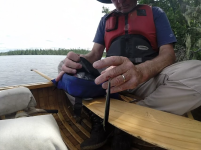This spring I had 2 trips planned, the second one had me going in solo to join in with a group trip. Was straight forward 12 km paddle, with a short portage and a 2.6 km one to get to the final lake. Although it was hot and i drank all my water on the big portage, I made to camp and had a long swim to cool down. The initial plan was that the group was going to be there for a few days, but the plan changed that they now intended move out, back over that long portage, which I knew I wasn't up to without rest.
Turns out a few folks where splitting off and moving deeper into the park, a 500 m and an 800 m portage set sounded more doable than the other 2.6 km one, so I joined.
It was quite overcast when we started out and that quickly turned to drizzle and the temp started falling, first 500 m was easy, we met and chatted with 2 other groups going the other way.
After winding through a small creek dotted with beaver dams, we got to the next takeout and an 800 m portage. I got separated from the group at this point when another group came in the opposite way and proceeded to spread all their gear at the takeout, while they took a break, which left me waiting for a bit on the water. At this point it started raining in earnest, making the trails a mess. The terrain was quite rocky and boggy, I completed my first carry (double carry), talked with the rest of my group at the other end and started back to get the last load. With my canoe and gear bag loaded, I got to just past the halfway point, where the trail started down a slope and there was a large mud pit to walk around ... it happened so fast, down the side of a large rock ... sounds I never want to hear again .... and a foot that shouldn't be able to bend that way.
I managed to get to the portage end, my friends retrieved my gear ... we discussed options as walking was not going to happen. I carry a PLB, but it was decided that using that on a portage leaves the group stuck there. So they loaded my gear and me into my canoe and we proceeded through the marsh, over 3 beaver dams, getting my gear and me out and in as required ... then out into the grasslands ... we paddled for the better part of 4 hours to get to the first campsite.
It was about 14:30 when we arrived, we popped the beacon, got tarps setup and changed into dry clothes to wait and think. The path out was ~25 kms of paddling and several kilometres of portaging,that didn't seem very doable ... hope that beacon works (really hope).
Around 19:00 hours we heard the drone of a helicopter heading straight at the campsite, they circled once and very nearly landed at the back side of the island ... we assumed a failed landing attempt. Then out of the bush comes a police officer ... the rest is a bit of a blur, there was a dock at the backside (for a nearby ranger cabin), the group cleared a path through the brush and got me to the dock, the chopper came in an hovered, one landing strut on the dock, the other over water, the rotors only a couple feet from the tree line ... the downwash from a chopper has to be felt to be be believed, they got me onboard and then it was over, I was inbound to the hospital.
Not quite over, 2 weeks in a cast waiting for surgery, 2 weeks in a cast after surgery, then 6 weeks in a boot (no weight bearing) ... I have a new plate and the tendons and ligaments had to be reconstructed. I am out of the boot for 2 weeks at this point and walking, it's a chore but getting there.
I share this to emphasize the importance of having an EVAC plan, this could have gone so much worse. A trip can go from being a grand adventure to literally being a nightmare in a few heartbeats. Having spent the time planning for the worst can make a huge difference in how a situation gets handled and obviously the outcome. The interesting thing about this is, I got the PLB in case some one else in my group got injured or disabled, with no thought it might ever be me .... if you think this, realize it could be you who gets into trouble.
I was with a great group and they helped me along and took care of getting my gear out ... although the guy who is currently storing it mentioned storage fees and something about salvage rights on the canoe (it was posted here as a light weight strip build).
Brian


